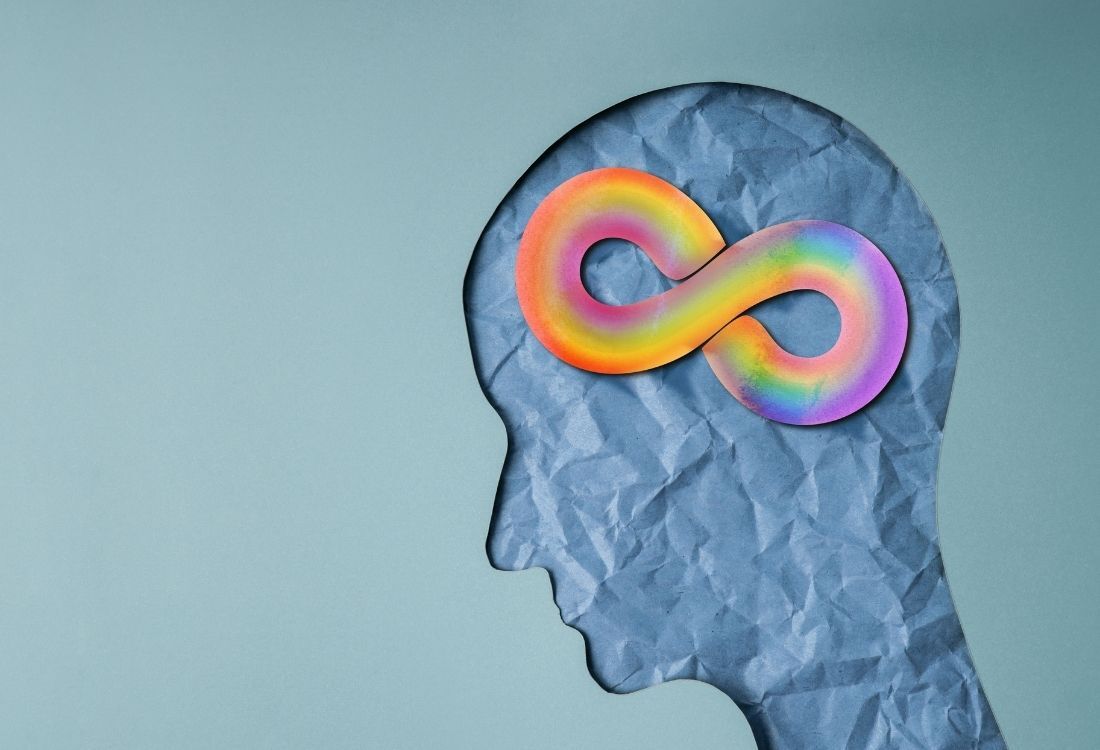Smart TMS’s Research Overview – TMS for Neurodivergent Populations
October 2, 2025 - Smart TMS

Definitions
Neurodivergent (ND) refers to a person whose brain neurotype is different than the typical, meaning their brain works differently in how the world is perceived, experienced, and processed. This can include, but is not limited to, dyslexia, attention deficit hyperactivity disorder (ADHD), autism spectrum disorder (ASD), Tourette’s, and dyscalculia.
Depression is characterised by a prolonged period of lack of pleasure, low mood, loss of interest and motivation alongside feelings of worthlessness and/or hopelessness. Depression often coincides with anxiety, which is defined as intense feelings of worry, panic, fear, and irritability.
Traditional treatments for these conditions often focus on resetting the mindset through therapies like cognitive behavioural therapy (CBT) or compassionate therapy, or prescribing medication for short-term relief. Transcranial Magnetic Stimulation (TMS therapy) is an evidence-based, non-invasive treatment that aims to rewire neuronal networks and improve functional connectivity to create long-lasting changes in the brain.
Current Literature
While TMS treatment for depression and anxiety has been found to be effective in neurotypical (NT) patients, its impact on neurodivergent populations is less researched (Hyde et al., 2022). Some emerging evidence has suggested that efficacy across NT and ND groups is comparable, with similar treatment responses (Smith et al., 2022).
Smart TMS and other providers have already demonstrated success using TMS for ADHD, OCD, and PTSD (Smart TMS, 2025). However, little is known about differences in response between groups for depression treatment. ND individuals are disproportionately affected by mental health issues and are more likely to develop depression and anxiety in their lifetime (Capp et al., 2025). This highlights the urgent need for more research into TMS for neurodiverse populations, including ADHD and potentially autism.
Smart TMS Study
In a recent study conducted by clinicians at Smart TMS, the effectiveness of TMS for neurodivergent populations was assessed, focusing on depression and anxiety treatment in those diagnosed with ADHD or Autism, compared with a control (NT) group.
Our retrospective chart review analysed TMS treatment outcomes using PHQ-9 reductions. Patients under 18, those who received fewer than 15 sessions, or with missing data were excluded. Neurodivergence was identified via clinical assessment. A one-way ANOVA tested the hypothesis that PHQ-9 score reductions would not differ significantly between ADHD, ASD, and NT groups.
Results
The results revealed no statistically significant differences in PHQ-9 reduction between NT, ADHD, and ASD groups (F (2, 500) = 1.86, p > 0.05, ω2 = .0034).
-
NT group (n = 468) – average reduction: .396 (SD = .406)
-
ADHD group (n = 20) – average reduction: .287 (SD = .376)
-
ASD group (n = 15) – average reduction: .552 (SD = .350)
The small effect size (ω2 = .0034) suggests the differences between groups were minimal. This supports the hypothesis that TMS therapy is equally effective for both neurotypical and neurodivergent patients, including individuals with ADHD and autism.
These findings support existing literature that shows comparable efficacy of TMS across different populations, demonstrating that TMS can be used to treat neurodiverse groups without compromising outcomes.
Future Directions
Future research should replicate these findings in a larger sample and explore individual differences within neurodivergent populations. This study was limited to ADHD and ASD, which is typical for neurodivergent literature. Therefore, results cannot yet be generalised to other ND groups such as dyslexia, Tourette’s, or dyscalculia. Expanding research into TMS for autism, as well as other conditions, would help broaden understanding of its effectiveness across neurodiverse demographics.
This research was submitted and accepted at the BeNe Brain Stimulation Conference and the Clinical TMS Society journal and conference. You can read the abstract here – Exploring TMS for Neurodivergent Populations - Transcranial Magnetic Stimulation.
TMS for ADHD, Anxiety, and Depression at Smart TMS
At Smart TMS, we are committed to advancing research into how TMS therapy can support neurodivergent populations. While we are actively monitoring research into the use of TMS for autism, our current focus is on treating ADHD with TMS, as well as offering highly effective TMS treatment for anxiety and depression. Many patients have experienced improvements in focus, attention, mood regulation, and overall wellbeing.
If you or someone you know is exploring alternatives to medication or traditional therapy for ADHD, anxiety, or depression, contact Smart TMS today to learn more about how TMS treatment could help.
Written by Carmen, our Smart TMS Bristol practitioner
References
- Capp, S., De Burca, A., Aydin, Ü., Agnew‐Blais, J., Lautarescu, A., Ronald, A., Happé, F., & McLoughlin, G. (2025). Depression and anxiety are increased in autism and ADHD: Evidence from a young adult community‐based sample. JCPP Advances. https://doi.org/10.1002/jcv2.70003
- Hyde, J., Carr, H., Kelley, N., Seneviratne, R., Reed, C., Parlatini, V., Garner, M., Solmi, M., Rosson, S., Cortese, S., & Brandt, V. (2022). Efficacy of neurostimulation across mental disorders: systematic review and meta-analysis of 208 randomized controlled trials. Molecular Psychiatry, 27(6), 2709–2719. https://doi.org/10.1038/s41380-022-01524-8
- Smith, J. R., DiSalvo, M., Green, A., Tolga Atilla Ceranoglu, Sheeba Arnold Anteraper, Croarkin, P., & Joshi, G. (2022). Treatment Response of Transcranial Magnetic Stimulation in Intellectually Capable Youth and Young Adults with Autism Spectrum Disorder: A Systematic Review and Meta-Analysis. Neuropsychology Review. https://doi.org/10.1007/s11065-022-09564-1
- Understanding Neurodivergence: TMS Therapy for ADHD, OCD, and More. (2025). Smarttms.co.uk. https://www.smarttms.co.uk/news/understanding-neurodivergence-tms-therapy-for-adhd-ocd-and-more










